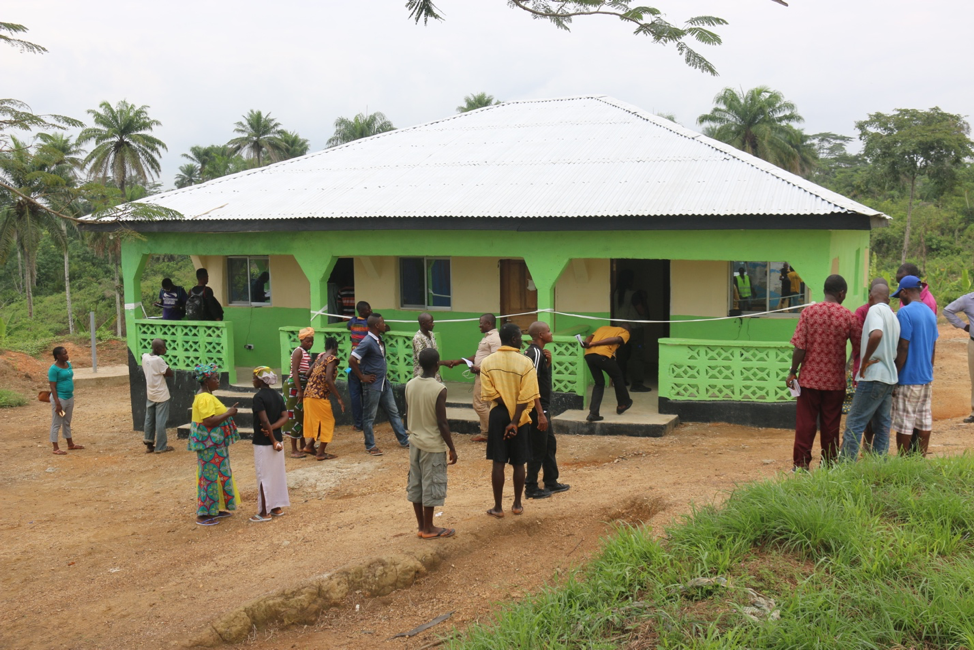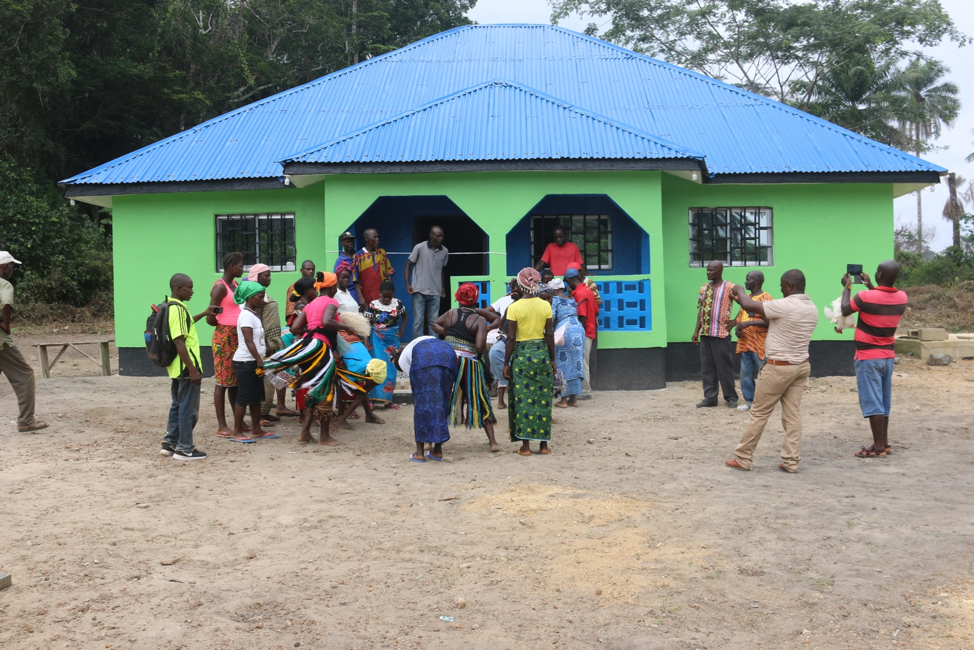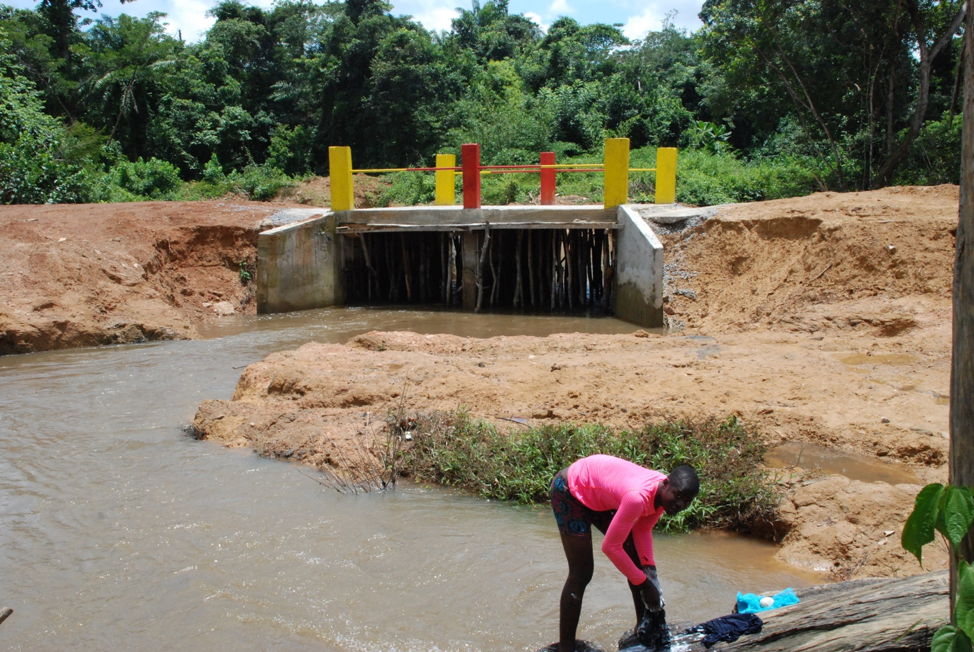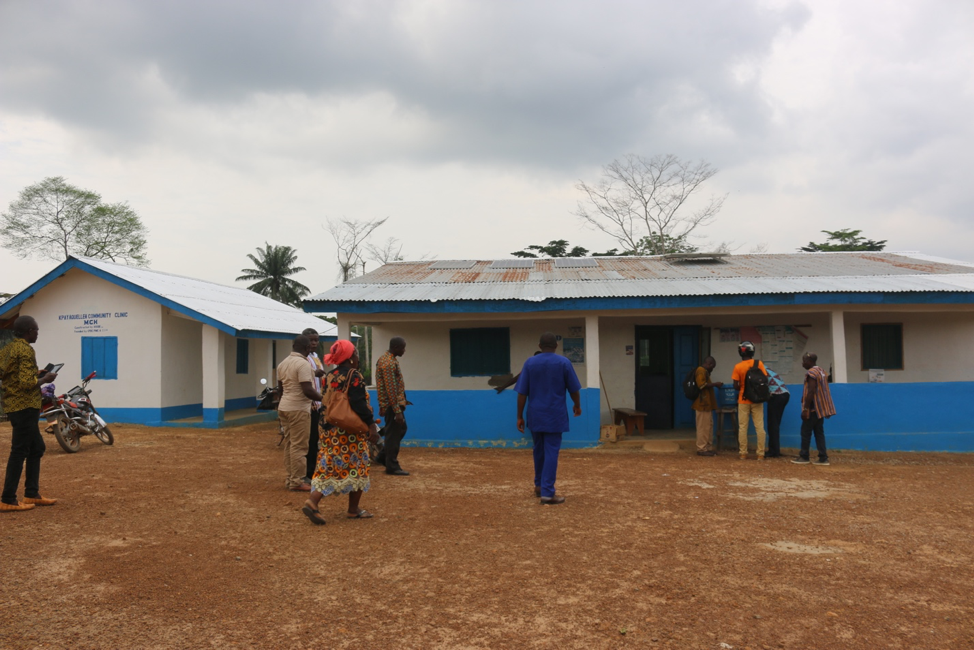Top: Kpayaquelleh Community Clinic is one of several projects undertaken from logging resources in Salayea District, Lofa County. The DayLight/James Harding Giahyue
By James Harding Giahyue
SALAYEA DISTRICT, Lofa County – The Kpayarquelleh Community Clinic sits on a hill in the town whose name it bears. Established in 2018, it caters to nearly 2,000 people here and seven other towns and villages between 10 km and 55.6 km all the way to Gbarpolu County. Its services include maternity, emergency, vaccination and other things. Drugs sold at the clinic are less costly as compared to other clinics, according to its administrators.
But the clinic is not run by the Ministry of Health or a nongovernmental organization. It is supported by community leaders with funds they generate from a logging concession signed between the government of Liberia and Alpha Logging and Wood Processing Company. The 25-year concession was signed in 2009, covering 74,186 hectares of forestland in Salayea and Zorzor.
“The money we get from the company, the community forest leadership purchases drugs,” says Deddeh Momolu, the deputy officer in charge of the clinic, in an interview with The DayLight. A sketch map of the clinic and another poster of communities, their distances and populations adorn a wall of the clinic.
“We are doing this because the funds are logging benefits we get from Alpha. Affected communities own the clinic,” Momolu adds.
By law, towns and villages affected by logging concessions signed between the government and companies are entitled to benefits from their forests. That is a crucial component of forestry reform in a country that marginalized locals for decades. But many communities are yet to receive things like log-harvesting and land rental, scholarship fees and dozens of mandatory projects. The government canceled over seven small-scale contracts in March earlier this year, leaving communities’ arrears unpaid, and promises of roads, schools and clinics unfulfilled by the companies that held those contracts.
Yet the Kpayarquelleh Clinic—and other projects here in the Salayea and Zorzor districts that were built with logging money—is a reminder of how forest resources can benefit rural communities.

Apart from the clinic, Salayea and Zorzor have seen a dozen of projects conducted with logging money between 2016 and last year that cost more than US$75,000. You have a guesthouse in Gorlu and another in Beyan Town, a market hall in Gbonyea and a school building in Fassawalazu. Six handpumps have been constructed in towns and villages as well as four toilets. Three hundred homes have received roofing sheets. There is a teachers’ lodge in Ganglota and Kpayarquelleh just next to the clinic. There is a resource center nearby—with forest-related books and development materials—where community meetings are held. And there is one concrete bridge under construction, one of two passages in the concession area.
“In terms of benefits to rural communities, the communities in FMC-A Lofa are benefiting to some extent in terms of the National Forestry Reform Law,” says Andrew Zelemen, the head of the secretariat of the National Union of Community Forestry Development Committees (NUCFDCs). “FMC-A Lofa” is the industry name for the Forest Management Contract Area A of Lofa County. The NUCFDC represents the interest of villagers whose forests are awarded to concessioners countrywide.
“We are appreciative of the work Alpha is doing there and we look forward to other companies doing that,” says Ekema Witherspoon, the head of the secretariat of the Liberia Timber Association (LibTA), which represents the interest of logging companies. “That is what we want.”
Alpha pays the community regularly for logs it harvests compared to other companies. It shares harvesting data with locals for checks and balances, according to Zelemen, who is also a member of the leadership of Salayea and Zorzor. He says the company is also regular with its harvesting payment.
It would have paid more if the coronavirus pandemic had not taken a toll on the company, stifling production and export, according to George Smith, the company’s general supervisor.
The industry’s numbers speak well for Alpha. Between 2009 and December last year, it paid the government of Liberia US$5,457,037, the second-highest in the entire industry, according to official records. Only International Consultant Capital, which operates in River Cess and Nimba, paid more (US$ 9,501,939.46).
“It is commendable when companies fulfill social agreements that are signed with the affected communities and we congratulate Alpha for doing so,” says Roberto Kollie, of the National Benefit Sharing Trust Board (NBSTB). The board is responsible to collect annual land rental fees from the government and oversee their expenditure in communities. Villagers are legally entitled to 30 percent of the land rental fee, which is a product of the total size of the forest and US$2.50. That is US$55,639.50 each year.

“We call on all companies to follow the example of Alpha by making sure that social agreements are fully implemented,” Kollie adds.
But all has not been rosy.
Just two years ago, the company and villagers had a frosty relationship over the payment of fees and projects. Villagers set up roadblocks and stopped the company from working. The protest was quelled only after the company made a commitment to pay some of its debt and promised to pave roads and erect bridges in the area.
The quality of some of the projects is poor, including the market hall in Gbonyea and guesthouses in Gorlu and Beyen Town, according to Kollie. “The National Benefit Sharing Trust Board has put in mechanisms that will ensure that greater value for money is achieved and the quality of projects improved during future implementation,” he tells The DayLight via email.
And Alpha still owes the communities here and in Gbarpolu over US$2 million in land-related fees, according to official records.
Witherspoon says there is still much to celebrate.
“One clear message it sends to the forestry sector, in general, is that there is a possibility for companies and communities to work together in a win-win situation,” says Witherspoon whose group conducted alternative dispute resolution (ADR) meetings with the parties that same year.
Payment Issues
By law, companies are to pay land rental fees to the government, which must pay communities 30 percent of that amount every year but that has not been the case. Between 2007 and 2019, the government paid communities US$2.6 million, seven times less than the legal amount, according to a 2020 report by Forest Trends. a 2020 report by Forest Trends, a U.S.-based NGO that promotes the sustainable management of forests, and conservation. The government reduced that amount by US$200,000 last year, after a string of protests at the Ministry of Finance and Development Planning in Monrovia.
To put that into context, out of the US$5.4 million Alpha has paid to the government, villagers in Salayea and Zorzor should have received US$1.6 million. That is more than half the amount the government has remitted to all the 23 communities that host forest concessions.
“The Benefit Sharing Trust Board continues to remain engaged with the government in ensuring that communities receive their fair shares of land rental fees,” Says Kollie. He tells me the institution is securing the payment of US$500,000 of the US$2.7 million allotted in the National Budget, with barely four months left in this year.
Zelemen calls for a long-term solution to the problem.
“We want to see an amendment to the law that will say that the 30 percent the law provides for the community should go directly to the Benefit Sharing Trust Board to avoid the bottleneck issues,” Zelemen says.
“I want to also see that the companies are paying on an annual basis,” he adds. The law provides that logging firms must pay their land rental fees before the date of the award of the concession each year. Moreover, payment of forest-related fees is a requirement for harvesting, export and new forest contracts. But that has not been enforced. Companies’ indebtedness to communities is the most common irregularity in the forestry sector.

For Momolu at the Kpayarquelleh Clinic, it will be a relief for her and the 20 to 25 patients treated there daily when the concrete bridge on the road to the facility is completed. The road is impassable during the rainy season for vehicles. Cars bringing women in labor and emergency cases had to take a farther route in order to bypass the bridge.
“That bridge will really be helpful to us,” Momolu says. “Let the company give what it has for the community so that we can continue our services, and continue to buy drugs.”
This story is a production of the Community of Forest and Environmental Journalists (CoFEJ).




